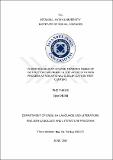Please use this identifier to cite or link to this item:
http://hdl.handle.net/11547/2039| Title: | IN-SERVICE EDUCATION AND TRAINING NEEDS OF INSTRUCTORS WORKING IN THE ACCREDITATION PROCESS AT VOCATIONAL QUALIFICATION TEST CENTERS |
| Authors: | Diler, Uğur |
| Keywords: | In-service education and training Vocational Test Center Accreditation Process National Occupational Standard Hizmet-içi Mesleki Eğitimler Mesleki Sınav Merkezi Akreditasyon Süreci Ulusal Meslek Standardı |
| Issue Date: | 2016 |
| Publisher: | ISTANBUL AYDIN UNIVERSITY INSTITUTE OF SOCIAL SCIENCES |
| Abstract: | Progression in education is achievable through well-educated teachers, and teacher training can be achieved by well-planned in-service vocational training. In this research, in-service training needs analysis questionnaires were performed on 99 instructors who seek to be assigned in vocational exam center accreditation process. As a result of the assessment of these questionnaires, it was concluded that nearly all instructors have in-service training needs directed at improving their performances. ANOVA analysis was used to assess whether the acceptance level for Important Factors in Training Needs changed depending on the education level. According to the results of the analysis, the importance of the training in terms of "knowing the job description and responsibilities of the organization where the individual will be assigned in Vocational Test Center" has shown differences depending on the education level (F=3.584; p<0.05). When mean values of significance level for almost all statements were examined depending on the training status of participants, it was determined that post graduates agreed that trainings are important at a higher ratio in comparison to other groups. Cronbach Alpha confidence coefficients were calculated to estimate the confidence level of exploratory factor analysis (AFA) in order for determining the Structure Validity and Confidence Analysis of in-service training needs questionnaire. Exploratory factor analysis method was used for statistically determining the structural validity of the questionnaire. Firstly, Kaiser-Mayer-Olkin (KMO) and Bartlett tests were performed to understand whether the questionnaire was compatible for factor analysis. KMO coefficient was calculated to test the sample size. According to the analysis result, statistically significant difference was determined for evaluation of the first aspect of the training needs among instructors with different training levels, however, no significant difference was revealed for the evaluation of the second aspect of training needs. No significant difference was detected at the second aspect of the training needs questionnaire as there were only trainings related to assessment and evaluation, and the instructors participated in this questionnaire had already attended these trainings. According to the TUKEY test results, which was performed to determine the group that caused difference in evaluation of first aspect of training needs, individuals with associate or bachelor's degrees showed the least acceptance level for the first aspect of the training needs, whereas post graduates showed the highest acceptance level. As a result of this, 15 instructors randomly selected among 30, were given 75-hour long training in 2014-2015. At the end of their training " Evaluation Form for In-service Education and Training (EF INSET)" was conducted and results for Training Planning and Program, Competence Level of Trainers, End of Training Gains, General Assessment were presented. Through open ended and Likert-scale questionnaires, observable progression was shown for the benefits of in-service training, Training Planning and Program, Competence Level of Trainers, End of Training Gains, and General Assessment criteria. Performance Evaluation Form for Instructors who have participated In-service Education and Training were filled, demo exams were executed, and technical experts completed performance assessment forms 30 instructors assigned in accreditation process of vocational test center; as a result of the questionnaires, differences between trained and untrained were presented. Performance form of untrained instructors and demo exams were reviewed by technical experts and it was determined that untrained instructors failed to properly achieve exam and documentation processes as they lack knowledge about 17024 accreditation process, don't possess necessary information about National Occupational Standards and not familiar with procedures and presses of Vocational Test Center; therefore, it was planned to provide in-service training to untrained instructors within 2016. The results of Wilcoxon test, which was performed to compare scores of pre- and post-training knowledge and skill-based performance items in the test group, are given in research. According to the analysis results, post-training scores for all knowledge and skill-based performance items have shown statistically significant increase when compared to pre-training scores (<0.05). Accordingly, the in-service training conducted has increased the knowledge and skill-based performance of instructors. Mann Whitney test was performed to compare pre-training knowledge and skillbased performance item scores of the control group and post-training scores of the test group and as a result, post-training knowledge and skill-based performance scores of the test group were statistically shown to be significantly higher than pretraining scores of the control group. According to performance assessment, when pre- and post-training performance assessments compared and demo exams conducted before and after the training were reviewed by technical experts, major differences were determined. Therefore, the obligation to receive these training raised in order for all instructors, wanting to take part in the accreditation process of Vocational Test Center, to conduct the accreditation process in healthy, proper, reliable and objective way and in conformity with the standards. In-service education and trainings are recommended for all current Vocational Test Centers and other exam centers planned to be established in the coming years in order for documentation processes in Turkey to be conducted according to these standards. |
| URI: | http://hdl.handle.net/11547/2039 |
| Appears in Collections: | Tezler -- Thesis |
Files in This Item:
| File | Description | Size | Format | |
|---|---|---|---|---|
| 432516.pdf | 23.98 MB | Adobe PDF |  View/Open |
Items in DSpace are protected by copyright, with all rights reserved, unless otherwise indicated.
